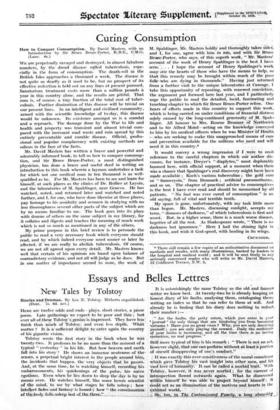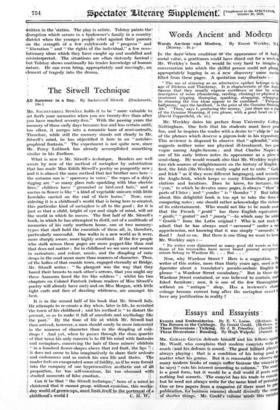Essays and Belles Lettres
New Tales by Tolstoy
Stories and Dramas. By Leo N. Tolstoy. Hitherto unpublished. (Dent. is. 6d. net.) HERE arc twelve odds and ends—plays, short:stories, a prose poem. Late gatherings we expect to be-poor and thin ; but over all of these Tolstoy's mina is iinpreSsed. They have less finish than much of Tolstoy, and even less depth. What matter ? It is a sufficient 'delight ,to:enter again the country of his gigantic vision.
Tolstoy wrote the first story in the book when he was twenty-two. It professes to be no more than the account of a typical " yesterday " in his life. But how heaven and earth fall into his story ! He shows an immense acuteness of the., senses, a perpetual bright interest in the people. around him, the incidents that happen, the very objects that he passes. And, at the same time, he is watching himself, recording his embarrassments, his quickenings of the pulse, his naive egotisms. Even when he lies doWn to sleep the day is by no means over. He watches himself, like some heroic scientist of the mind,- to see by what stages he falls -asleep ; how intellect fadesand 'fantasy is loosed 's how "the consciousness of the,body falls.asleep. last a,tb,c.illree:!_ co_ It is astonishingly the same Tolstoy as the old and famous Writer we know best. At twenty-two he is already keeping an honest diary of his faults, analysing them, cataloguing them; writing an index so that he can refer to them at will. And already he is finding that his diary does nothing to reduces their number 1— " Are the faults, the petty errors, which you enter in your ' journal the-only things that are hindering' you from becoming virtuous 2- Have you no great vices ? Why; you are only deceiving yourself ; you are only playing the coward. Daily :the multitude of your faults is increasing, and all the time there is no -lasting correction, no real progress."
Still more typical of him is his remark : " There is not an act, however slight; that one' can perform without at least a portion of oneself disapproving of one's conduct."
It.was exactly this over-sensitiveness of the moral conscience which gave TOIstoy his vast insight into other men, and his vast-love Of lnimanity. It can be called a morbid, trait. With TolstOy, however, it was never morbid ; for the current of introspection flowed outwards again. What he discovered within himself -he was -able to project beyond himself ; it
Could act as an illumination of the motives and hearts in the external world.
_ too, in .74 _X--gniu/nAgtett Family, a long absin'tl:tf Written in the 'sixties. The playis satiric. Tolstoy paints the' gisruption which occurs in a landOwner's family in a country district when the younger people rebel against their parents' on the strength of a few- catehwords of " progress " and liberation " and " the rights of the individual," a few revo- lutionary ideas which they have caught up and muddled and' misinterpreted. The situation& are often. riotously farcical tiut Tolstoy shows continually his tender knowledge of human nature. He can even bring, appropriately and 'movingly, an element of tragedy into the drains.



























































 Previous page
Previous page